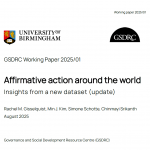Rachel M. Gisselquist, Min J. Kim, Simone Schotte, and Chinmayi Srikanth Abstract: Affirmative action (or ‘positive action’) measures have been adopted in dozens of countries around the world as a means of addressing group-based inequalities in educational enrolment, employment, political representation, and other areas. Although there is a large research literature on ...» more
Social protection
Pathways to Increase Rural Women’s Agency Within Social Protection Programmes
This rapid evidence review explores literature on how social protection programmes, particularly cash transfers and public works programmes, can address various dimensions of poverty and wellbeing that rural women face. This review focuses on the economic aspect of women’s livelihoods and wellbeing and examines how the design and implementation of social protection programmes ...» more
Workplace-based Learning and Youth Employment in Africa
Workplace-based learning is a supply-side approach to youth employment that includes practical or on-the-job training that is usually provided through an apprenticeship, internship, learnership , work placement or other practical training component of a vocational education or training programme. For the workplace-based learning approach to be effective, it requires ...» more
Mapping of stakeholders engaged in Public Works Programmes (PWPs)
Public works programmes (PWPs) have received increasing attention as a social protection intervention due to their perceived benefits of tackling poverty by addressing basic consumption needs whilst improving public goods and community infrastructure. This helpdesk report maps organisational and individual actors engaged in PWPs in development and humanitarian contexts from a ...» more
Social protection
Social protection is commonly understood as ‘all public and private initiatives that provide income or consumption transfers to the poor, protect the vulnerable against livelihood risks and enhance the social status and rights of the marginalised; with the overall objective of reducing the economic and social vulnerability of poor, vulnerable and marginalised groups’ (Devereux ...» more
Linking Social Protection and Humanitarian Response – Best Practice
This review looks at the alignment of humanitarian response in refugee crises with national social protection systems. It examines the experience of three countries dealing with protracted refugee situations: Turkey, Lebanon and Cameroon, and also identifies lessons from other literature. The number of people affected by crises and disasters continues to rise, and ...» more
Social Safety Nets in Fragile and Conflict-Affected States
Social safety nets in fragile and conflict-affected states often include cash and in-kind transfers, school feeding programmes and public works programmes (O’Brien, Scott, Smith, Barca, Karden, Holmes, Watson & Congrave, 2018). Programmes often target vulnerable households, refugees and internally displaced persons (IDPs) in order to reduce their exposure to shocks and ...» more
Cash-Based Initiatives for Refugees in Jordan: Annotated Bibliography
The available literature tells us little about the effectiveness of targeting of cash-based initiatives (CBIs) for refugees in Jordan. However, it suggests there are positive impacts on food security for refugees, their ability to pay for rent and utilities and their psycho-social well-being, as well as some reduction in resort to negative coping strategies. The impact of CBIs ...» more
Cost-Effectiveness in Humanitarian Work: Cash-Based Programming
There is consensus in the literature that giving people cash in humanitarian contexts provides greater choice and dignity while at the same time stimulating local markets. In comparison to in-kind approaches, cash emerges as more efficient to deliver and – depending on the particularities of a given context – it can also be equally or at times more effective at delivering the ...» more
A Mapping of Larger Youth Employment Programmes in Developing Countries
There is a robust literature on youth employment that spans academic and grey literature. This rapid literature review combines academic and grey literature to identify larger youth employment programmes in developing countries. The review identifies the countries, which have a national youth policy. There is no literature that assesses the sustainability of national youth ...» more
Benefits of Internships for Interns and Host Organisations
Internships enable students to acquire skills, which cannot be learned in the classroom environment, while employers obtain access to low-cost labour and reduced recruitment costs (Galloway, Marks, & Chillas, 2014; Holyoak, 2013; Maertz, Stoeberl, & Marks, 2014). Interns develop interpersonal skills, team-working skills, professionalism and customer management ...» more
Designing, Implementing and Evaluating Public Works Programmes
This helpdesk report aims to outline the scope, impact and challenges associated with public works programmes (PWPs) in development and humanitarian contexts. PWPs have been implemented in a broad range of countries to help working-aged poor people to cope with economic shocks or chronic poverty (McCord, 2012b). The majority of PWPs are effective in terms of increasing food ...» more
Lessons Learned from Youth Employment Programmes in Developing Countries
Youth employment programmes are varied but meta-analysis and systematic reviews of impact assessments of these programmes indicate that some interventions have an overall positive effect on employment and earnings. Assessments of programmes which support youth job creation in the private sector find that larger businesses are more likely to generate jobs than micro-enterprises. ...» more
Lessons Learned from Youth Employment Programmes in Kenya
The government of Kenya with the support of multilateral donors, especially the World Bank, has introduced several youth employment initiatives since the 2000s, including a large-scale public works programme. There is a mix of supply-side programmes which provide training to enhance the skills of the youth labour force and demand-side initiatives which facilitate ...» more
Assistive technologies in developing countries
Assistive technologies enable people to live healthy, productive, independent and dignified lives, yet most people who need them are currently unable to access them. This rapid review looks at examples of existing literature on the availability of assistive technologies and efforts to make these technologies more affordable and accessible in developing countries. ...» more
Interventions to support victims of modern slavery
This review found few evaluations of interventions to support victims of modern slavery, even though there is recognition of the need for support services. While there is little evidence on effectiveness of interventions, the literature highlights the importance of victim-centred, holistic (multi-disciplinary) approaches to supporting victims. There is strong consensus in ...» more
Cash transfer platforms in humanitarian contexts
As cash transfer programming (CTP) in humanitarian contexts has increased, so has the use of multipurpose (unconditional) cash transfers and the range of actors providing them. Use of different cash delivery platforms by different agencies can increase costs, inefficiency, and the risk of duplication and fraud, so 'single cash platforms' (the same delivery mechanism for cash ...» more
Conflict-sensitive cash transfers: social cohesion
The literature suggests that the effects of social protection initiatives such as cash transfers and vouchers on social cohesion are positive, but there is very little empirical evidence to back this. This review found no research comparing cash transfers and vouchers from the perspective of social cohesion. Experience of cash transfers in developing countries, including ...» more
Conflict-sensitive cash transfers: unintended negative consequences
Risks associated with cash transfer programmes in fragile contexts include theft, diversion, corruption, security, targeting, misuse by beneficiaries and inflationary effects. However, the literature indicates that – while different – these risks are no greater than those associated with other forms of aid, e.g. vouchers or in-kind goods, and could even be less. Cash transfer ...» more
Flexibility in funding mechanisms to respond to shocks
In order to better and more rapidly respond to shocks such as sudden onset disasters, there have been increasing efforts to build flexibility into humanitarian or development funding arrangements, as current emergency responses are often slow to arrive and/or unresponsive to forecasts of disasters (Start Network, 2017; Rüth et al, 2017, p. 2). This rapid reviews looks at ...» more





